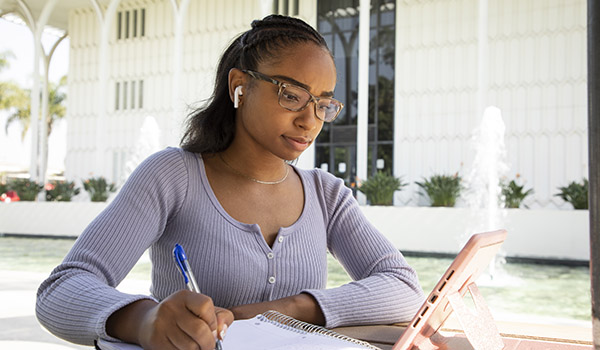
In March 2020, the world shut down due to COVID-19, forcing universities to pivot from in-person to virtual learning in a matter of days. We asked accounting faculty about their virtual teaching experience and to share key takeaways and lessons learned.
Tony Menendez
The past year has been defined by the frustrating dynamics of remote learning, fear for those working on the front lines, and loss of in-person contact with friends and loved ones. I am most proud that my students didn’t let the past year define them.
I spent a great deal of time thinking about what we all missed due to going virtual. My biggest takeaway from the online teaching experience is that technology can provide flexibility and accessibility, but for our students to succeed, we must balance the technology with human connection to pass on our knowledge and experience.
Scott Delanty
My confidence at age 65 was awash in new methods for launching virtual classes and handling student needs in distant time zones. Luckily, LMU stepped up with online resources and practical tips for student engagement. Then social justice issues exploded in the George Floyd aftermath, and again, LMU’s deep resources offered proactive classroom approaches on racism and social justice. I was glad to be part of the broad uptake of our dean’s persistent push for moral courage. What started as a test of resilience became a breakthrough in creative confidence for professors and students alike.
The challenges of prolonged Zoom engagement invited more interactive, student-led discussion. Another unexpected benefit was having nearly 100% attendance. I now admit some 2020 fleeting thoughts of retirement, but LMU’s resilience has given me a fresh, higher view of community and adaptive skills.
Tyler DeGroot
I’m most proud of how our faculty, staff and students adapted to such a big change. Our faculty are so innovative and put so much time and effort into making the online experience as good as it could possibly be. Despite many challenges, my students worked hard to be engaged in class, did their best to develop community with their peers, and ultimately, put a lot of time and effort into learning a challenging topic.
This experience opened my eyes to how technology can be used to support students. For example, class recordings and Zoom office hours were a great resource . Everyone has different needs and several of my students relied on asynchronous learning because it allowed them to work a job and better support themselves and their families. Zoom office hours proved to be an effective way to connect with students, especially for those who are traveling, on a sports team, or simply need support from the comfort of their dorm room.
Nancy Coster
I am proud of the perseverance and positivity of our students, faculty and staff. When faced with a challenge, we adapted, and found new ways to engage and continue learning. I really enjoyed learning more about my students as individuals. I met some of my students’ roommates, family members and pets on Zoom. We shared real-time weather updates from around the world and office hours often led to fun discussions about favorite foods, travel tips and movies. But one of the best parts was beginning each class and office hour session by greeting each student by name, seeing so many smiling faces and creating the community that is LMU.
The biggest takeaway from the online teaching experience is that it is still teaching. The modality is different, but students are still eager to learn and engage. Accounting can be challenging, but our faculty are supportive and want to see the students succeed. Compassion and organization are key when teaching, regardless of the modality.



